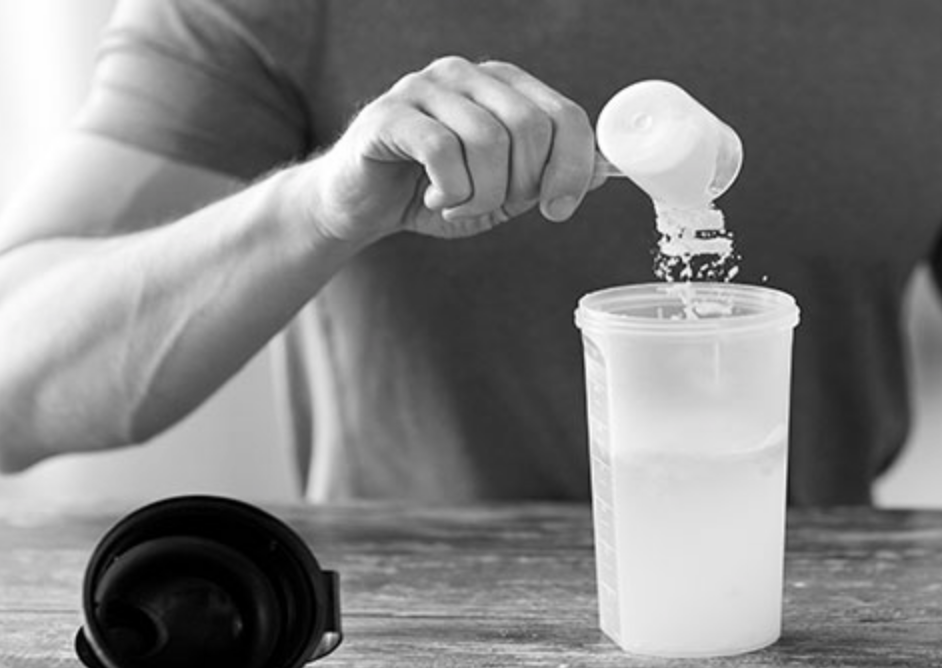
By Mintra Mattison
Last week, we asked our community to participate in our nutrition survey, asking several questions in regards to legal and illegal supplements. The participation was great: we collected over 500 responses.
Survey Take-Aways
The participants were mostly male (95% male and 5% female) and ranged between the age of 18 to 74.
The Majority with 42%, was within the age group 25-34.
Overall we got a good mix of athletes from the MTI Community. Military Athletes (41%), followed by General Fitness Athletes (22%), followed by Law Enforcement Athletes (14,5%), then Mountain Athletes (14,3%) and finally Fire Rescue Athletes (6,2%).
The Survey stated that 92,5% of our community uses supplements. Protein being their main choice of product (73,4%).
The majority also stated to take supplements 7x/week (37%), to maximize fitness training effects (39%).
11% of the participants said that they are or have been using Performance Enhancement Drugs (PEDs). Mostly acquired legally by prescription (82%). Testosterone being the most used (24%).
What’s interesting was, when asked if taking supplements works and if so how – a lot of participants stated that they use supplements as a meal replacement, or to help with weight control and caloric intake.
Survey
Below are the results of the survey along with an extract of the open question answers.
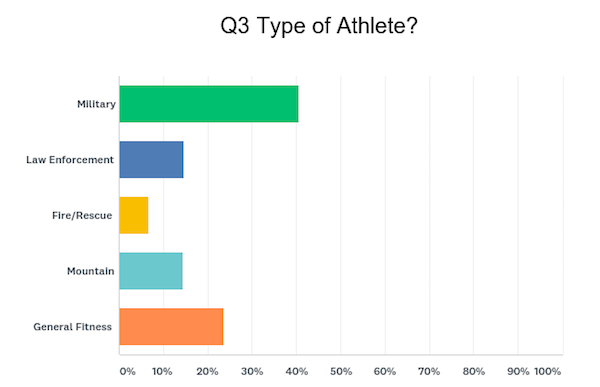
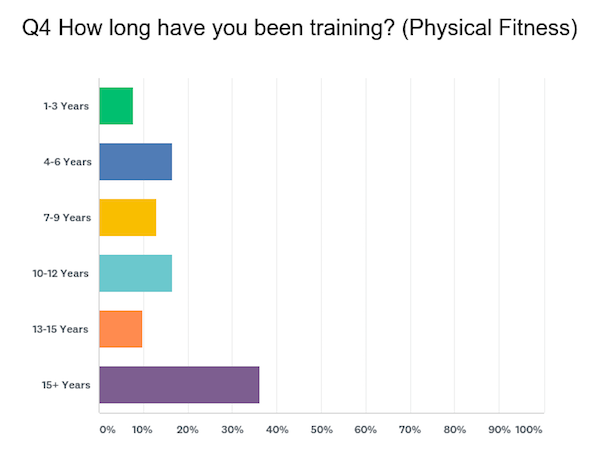
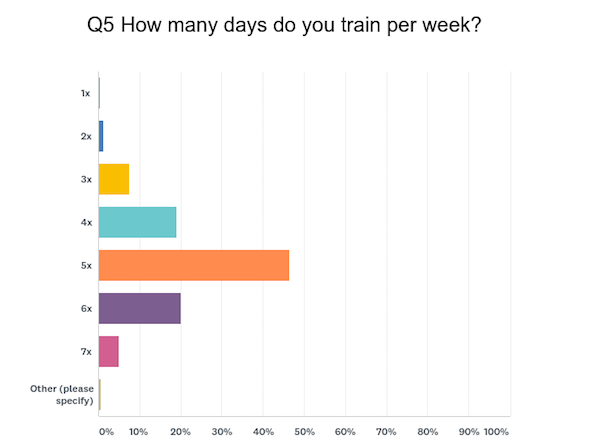
Other:
- 10
- 10-12
- see-saw over the years… from 0 to 6
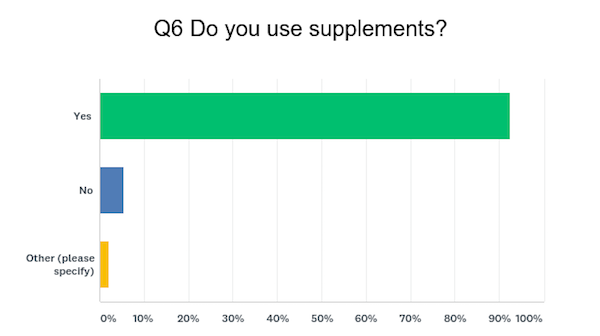
Other:
- Full fat Chocolate Milk
- Caffeine/B vitamin water mixers
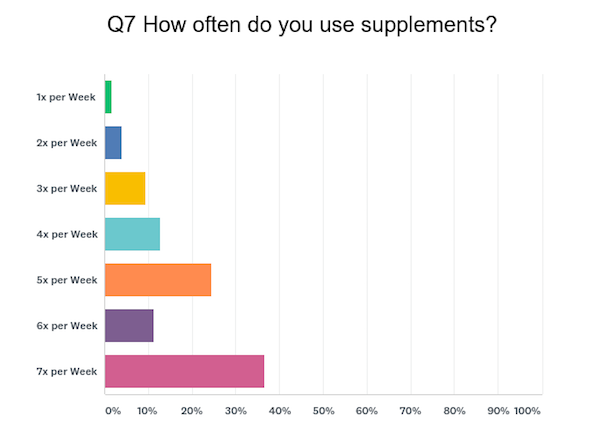
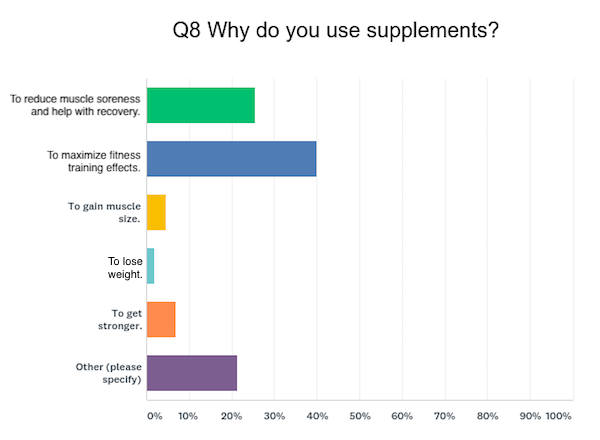
Other:
- All of the above, minus weight lose.
- Maintain overall health
- Fill in dietary gaps
- Hoping it will give some type of energy and sometimes others as meal add-on.
- To supplement my current food intake and convenience
- To increase protein intake quickly without having to cook something
- heart health, joint health,
- Health, maximize cognitive function, anti-aging and to prevent reoccurrence of a brain tumor
- Memory/focus
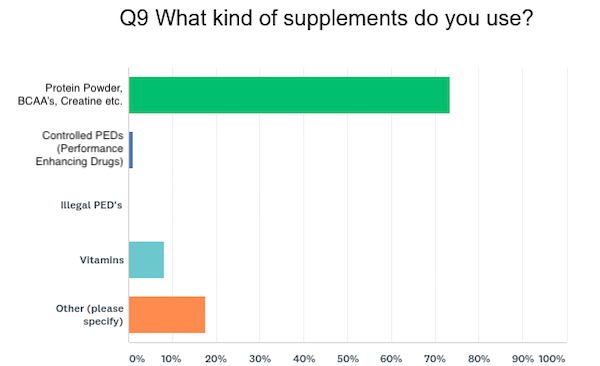
Other:
- Protein powder high quality with no sugars, multivitamin, fish oils, have done PED’s in the past, my strength levels are fairly high and do not have a use for them at this set age in life.
- Caffeine/B Vitamins
- Tart cherry extract, probiotic, BCAAs, creatine, green drink supplement(kale, algae, etc)
- Spirulina Powder
- Krill oil
- Blended greens
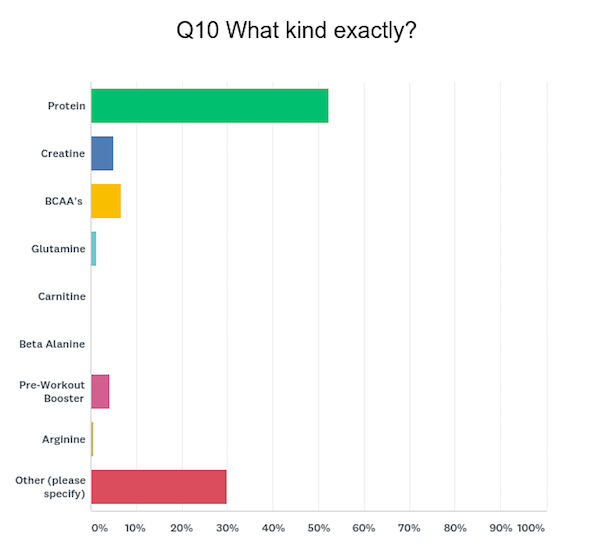
Other:
- Green Superfood
- Calm – powder magnesium supplement to help me relax\sleep
- Vit D
- curcumin, fish oil, vitamin d, coqu10
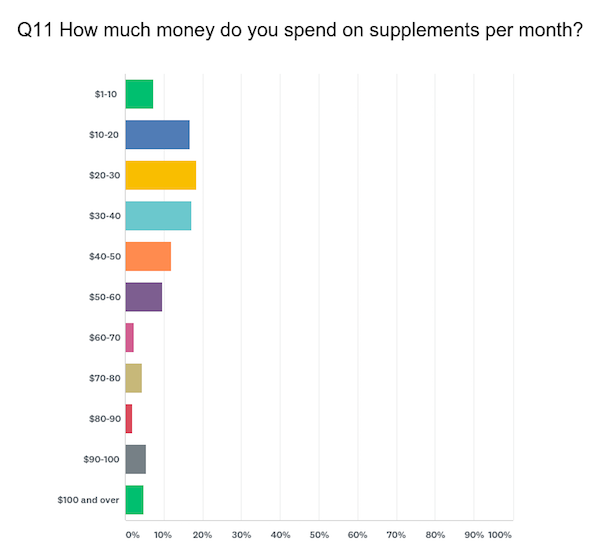
Q12 Which brand(s) do you prefer? Please be specific.
Answers:
- Optimum Nutrition (12,95%)
- GNC (4,08%)
- Vega (4,08%)
- Onnit (3,60%)
- Jym (3,36%)
- Soflete (3,36%)
- Thorne (2,88%)
- Wilderness Athlete (2,16%)
- Myprotein (1,92%)
- True Nutrition (1,62%)
Q 13 Have you had any negative effects/experiences with supplements/PEDs? If so, please be specific.
Answers:
- No (64%)
- Yes. Taking too much can harm my kidneys, and one day I felt bad so I decided to reduce the consumption to a normal post workout shake.
- I haven’t had negative experiences, but I have had experiences with supplements that haven’t done anything for me. I’ve narrowed things down at this point to the products I feel are actually helping me to achieve my health, fitness, and performance goals.
- Occasional bloating
- Omega 3 + vitamins. Pain in heart region. Stopped taking immediately.
- Excessive soreness with Progenex, Jym Products, and Optimum Nutrition Products
- Pre-Workouts can be harsh.
- Nothing more than an upset stomach.
- Gastrointestinal distress with creatine, migraines with preworkout supplements that contain caffeine
- With prescription testosterone- high blood pressure, hair loss
- Trouble urinating with “Bang” energy/creatine drinks
- I took a pre-workout supplement that made me nervous and anxious
- Barack acne
- Rapid heartrate with ephedrine, vomiting with a thermogenic
- In past, Gonadal suppression with PEDs and “rebound”
- I thought they contributed to my second kidney stone.
- I tried a pre-workout supplement from Cellucor (C4 Sport). The first workout I used it, I felt like my heart was going to beat out of my chest, and I urinated constantly throughout the day. The second time I used it, I felt nauseous. The third time I used it, I felt nauseous and couldn’t stop breathing hard for a solid 2 hours. Also urinated excessively.
- Some pre workout sups have negative effects on mood, sleep, appetite
- I don’t use creatine anymore because of risk to the kidneys
- Did not like the effects of pre workout i.e. itchyness
- Yes, when I take off the shelf pre-workout it upsets my stomach.
- Vpx Melton gave me heart palpitations.
- Upset stomach from Creatine; constipation if I use more a couple servings of protein powder daily
- nitric oxide enhance supplements, I faint
- WAY back in the day I took ephedra based stuff. Pretty sure it’s partly responsible for a friend’s heart-related death at the age of 20 (we were at military school, he was SUPER fit), too.
- When I didn’t know any better I used to buy cheap, unhealthy, and poorly manufactured supplements such as NO-Explode/other nitro supps, Jack3D, Animal Stack, and Antler Velvet spray, that provided an overwhelming ‘pump’ but side effects included jitters, skin flushing, headache, heart palpitations, lightheadedness, dizziness, anger, and diarrhea.
-
Eye-lid twitching when you using creatine
- Went positive on a urine test
- Problem keeping an erection
- Light rash with traditional Creatine; switched to Creapure.
- Extreme hunger craving after injection
- No, but I never went crazy with pushing the envelope on dosage. Most people who I have known who have had problems either did to much, pre workout especially, or refused to cycle off (PEDs)
- Yes. I used to take pre workout supplements (N.O.) and on multiple occasions it made my heart rate spike, which made it difficult to catch my breath during certain workouts. I have not used pre workout supplement in several years since those negative effects.
- I have experienced cramping and kidney pain while on creatine. I struggle to consume enough water.
- L-citrulline made me puke

Other:
- Not using PEDs (26%)
- SARMs – Ostarine and Cardarine
- I don’t however in 2005 I tried prohormone Methyl-one-test from VPX prior to it becoming removed from the shelves, only for about 6 weeks. Haven’t tried or used anything like that since.
- CBD / THC
- Sermorelin Acetate
- Trenbolone acetate
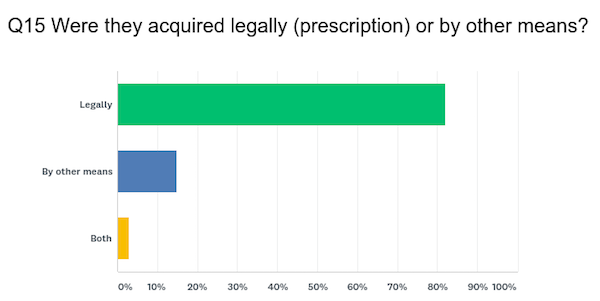
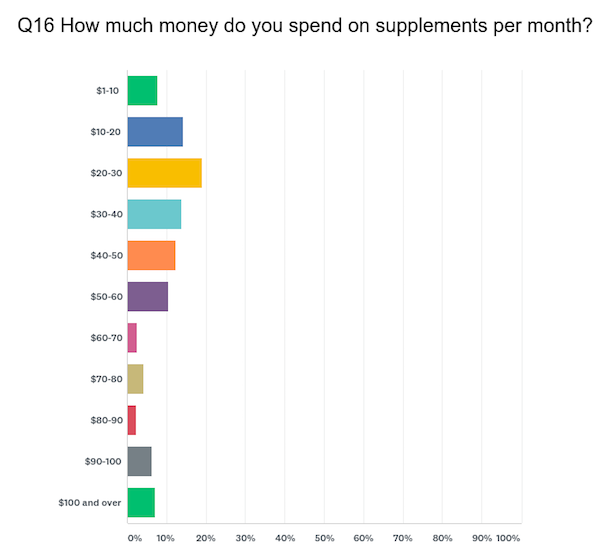
Q17 Have supplements worked for you? If so, how?
- Yes (40%)
- Help with recovery/soreness (25%)
- Yes, keeps my body supported in times of stress/neglect
- Protein powder for convenience. Vitamins for health
- Yes. Improved weight gain, muscle recovery, improved skin, hair, and nails
- Yes, primarily the recovery-oriented supplements that address muscle/tissue soreness (specifically Hammer Recoverite + Tissue Rejuvenator)
- I have seen DRAMATIC increases in strength through your programs (eccentric strength training) & supplementation (creatine hcl & protein)
- Yes. I don’t get sick & have stayed lean
- Good for meal replacement and calorie control
- Yes, I think so. I’m stronger than before and have more muscle mass.
- Preworkout helps, I use protein as part of my nutrition plan so it helps me get more protein in my diet, not sure if the EC stack works since I also have calorie reduction with it, the other two natural supplements are for stress reduction and cortisol reduction so can’t tell if they work in isolation or if the combo of everything else is where benefit is found.
- The HCG brings my low T level up to the upper third of normal production, protein is just to ease the consumption of protein calories (extra food)
- Yes, especially since I do not have time to cook and to eat all the calories I need to balance my training schedule.
- Research shows that supplementation with protein post-workout helps with recovery and maximizes muscle growth. I also use it to help control my appetite at night!
- Yes, i am very much stronger but not huge
- Yes mass and strength
- Yes and no. Supplements have only had a positive effect if I stay disciplined in training and recovery.
- The Calm Magnesium powder helps me sleep and relax at night. I take the protein powder I out of habit so I don’t really know
- Yes. After training I use one scoop of protein in 6-8 oz of whole milk for recovery and it keeps me from eating anything else until my next meal.
- I guess….I think with creatine I have found less soreness once I started taking it. Protein shakes have been a quick post recovery food source since I work out at lunch time. I normally have shake right after the workout (less than 30min) and then eat lunch about an hour later maybe.
- Yes. More focus and energy at beginning of workout
- yes, reduction in soreness and joint pain in order to keep training
- Yes. I attribute at least some of my performance at my age to supplements.
- Yes. Able to recover from field exercises and missions quicker and get back into training after injuries.
- Yes, when I cut out the protein powder I struggle to eat enough calories and often lose weight.
- yes, helped with weight gain, strength
- Yes. Reduces recovery time, increase focus and intensity of workouts
- Protein and vitamins fill gaps in my diet when I can’t cook and eat optimally. Creatine has a noticeable effect on training intensity. ZMA noticeably helps recovery.
- For my protein at breakfast, muscle growth support
- Preworkout gets me motivated to train, it’s a nice kick in the butt. Creatine, BCAAs help me recover.
- Help to promote and sustain muscle growth Ephedrine – YES (energy, bronchodilation) 6 OXO (helped “beef up” testicles post cycle LOL), Prohormones (Size, strength, recovery)
- Yes. I feel less drained the next day after a hard workout. My muscle mass has also been maintained as I’ve gotten older compared to others my age.
- I think they do fill gaps in the diet, and i do like Soflete’s Teddy Bear nite nite to help me sleep and recover.
- Yes improved cognition sleep
- As a former military now “quinquagenarian” athlete at least for me is a qualitative focused work out. Whether its kettlebells, olympic lifting, WODs or rowing crew I prefer sustained “safe” energy with collagen as part of joint recovery. This also includes a occasional can of V8 with a couple of aspirin or tylenol 🙂 The collagen is working as I don’t really need aspirin/tylenol for post recovery, and the vote is still out on NADH as I just started taking it.
- Healthy and handy meal replacement.
- Yes, It helped increase size and strength
- They have worked but noticed poor performance without supplements.
- absorbable protein, vitamins to supplement loss from physical stress (long endurance sports) glucosmine for joints
- Seem to help if I’m consistent. Strength gains in lower rep ranges from creatine. Body comp improvements from protein supplement when deployed to get proper amount each day
- Beta alanine reduces the amount of lactic acid and muscle soreness helping me during endurance events and short max effort situations. Protein powder helps me get the amount of protein my body needs to sustain muscle while maintaining an endurance aspect of training. Vitamins help me fill in the gaps in my diet specifically on long days at work where a proper diet is impossible
- I feel a noticeable difference in strength with creatine usage.
- Less joint soreness and overall well being
- yes, less soreness, stronger and more lean
- I didn’t take supplements for a very long time. My thought was that if I couldn’t do it naturally, then my body didn’t need to do it. I started with protein about 4 years ago, shortly after my training focus shifted from endurance-based to strength-based and I noticed more energy during workouts and faster recovery. I added creatine about 2 years ago when I noticed some plateaus that I had difficulty overcoming. After using the creatine I was able to overcome some of those plateaus in fairly rapid succession. It should be noted, that I simultaneously shifted some training, so I can’t give full credit to the creatine, but I believe it assisted in the process.
- yes, significant recovery and stronger workouts on creatine
- Yes. Alpha Brain gives me clarity on daily tasks and makes me remember my dreams. I don’t usually remember my dreams.
- Yes, I could actually tell a difference in my workout routine. Now after I stopped using some of them during Oct – Dec, I did fall into a somewhat lethargic status. Now that could have been because I had stopped working out and my diet started declining because of a work schedule issue. That my appetite changed literally overnight. So by a degree, it is necessary for certain supplements.
- Magnesium helps the legs after a big day. I think my mixture of BCAAs and Beet root powder amp up my workout staminaThe vitamins and joint complex supplements that I use daily seem to help with recovery and maintaining consistent energy levels throughout the day.
- gained in size and recovery due to shift work and travels they are very useful

Q19 Any other comments or thoughts about supplements?
- I think it is okay to try and to evaluate what works and what doesn’t. When it does not feel right, stop. Sometimes take less is better than too much or just nothing. What works for somebody else does not mean to automatically work for you. I read a lot about Supplements, Vitamins and Minerals. It’s more complex than just taking some pills and some pulver. You should not take something without knowing what it really does to you, this is not a game it is your body and you only have one…
- I am a recreational athlete and while I aim to maximize performance, I do believe that I can get every nutrient necessary for recovery in real food. So far, it’s been working great!
- Real food first. Vitamins and protein shakes fill gaps within reason. Steroids, T, “preworkout,” etc. will be the “big tobacco” killer of my generation – I guarantee it.
- I didn’t seem to notice gains and then I found out I was gluten and dairy intolerant and 15 years ago there weren’t any supplements that met that criteria. Haven’t felt the need to try them since.
- I think there’s a lot of junk out there. There’s also a lot of white-label stuff that companies are reselling and just adding their own margin. And the vast majority is not FDA-approved, so it’s entirely on you. It’s important to research each company and its products + ingredients. Know the purpose of each ingredient, how it affects your body, and the expected benefits. If you don’t know what you’re putting in your body, then don’t do it. Simple.
- For the most part, I think that legal supplements only help you “get over” plateaus. This is just my opinion though.
- I do question them sometimes Still. But maybe the mental aspect is the most important part. I have also started reading examine.com for their advice on supplements, including vitamins and minerals supplements.
- I have low t and have been prescribed t for a few months. Noticed a difference within the second month. Recovery time, endurance, fat loss have all had significant changes. I sleep better and have energy again.
- I am interested in trying steroids later in my life when I feel that it’s hard to progress in natural means.
- Protein after a workout seems to reduce soreness. I also will drink a protein shake instead of eating while on shift work.
- Whole, real food is always primary. But, the convenience of powdered protein/creatine/BCAA and multi-vitamin/fish oil capsules goes a long way toward helping me believe I’m doing everything I can to take care of myself and live well.
- Protein shakes are used as dessert and quick breafasts
- I never questioned my supplement use until 2011 when I started with MTI. I honestly feel better and healthier when I don’t take any.
- Have to be cautious, lots of money to be made out there so always room for corruption.
- Wosh it were possible to conduct a mini-study on myself and isolate the supplements to validate them, but sadly my schedule/work expectations do not allow for that.
- I’ve wasted a lot of money on supplements that didn’t work as advertised.
- Certainly interested in what comes out of this survey. Always looking for better more effective supplements that are legally acquired on the market. You guys do a hell of a job programming by the way.
- I honestly have no idea if whey really works. I know that when I followed Meathead cycle, it helped to eat extra “add on” meals after normal ones (extra tbsp. of peanut butter, for example). I think that drinking a monster 2-3 per week before working out gets me mentally ready as far as a ritual. I used other pre workout supplements when I was younger and newer to training, but now I think it’s more about mindset versus what proprietary blends I can shove down my throat.
- I am in the minority- long time fitness person who goes on caffeine , good , food and occasional protein shakes. I have yet to find anything else worth the $ for fire dept work
- I also take a pre work to help me get going at 4am
- I am huge on the supplements being clean, transparency and 3rd party tested.
- I workout early, before work. I pretty much take C4 to get things (poop) moving before my workout/run so I’m not interrupted. Protein powder for filler and taste.
- I think that like anything, moderation is everything for supplements. I only take whey protein when I have trained that day and it seems to help with my endurance and progress in the Big24 program.
- Supplements ARE NOT NEEDED, that’s why they are called supplements. Eat food as close to the way God made it, get about the right amount of calories and macros, vary your diet, and listen to your body. It’s a lot smarter than you realize.
- Supplements, like any other substance, when taken in moderation can have positive effects on training. However they can become addictive (especially preworkout) and I have personally experienced and witnessed addiction. Its is important, in my experience, to take supplements in cycles, training with them and without them. I believe better education on supplement use would prevent many of the problems people experience when they take them. A lack of education is the real problem, not necessarily the supplement itself.
- I try and keep it to only protein shake and creatine. I am not a regular user of either. Some weeks I might use it every day, some weeks only a couple of times. I try and feel how my body is doing and tweak usage, if tired and feeling down I will use it to help. Especially if I did not sleep good and don’t have energy I will take a pre-workout like NOEXPLODE but only for strength days. I don’t take NOEXPLODE on cardio focused days…I don’t want to have a heart attack during the workout lol…
- I eat whole food.
- This survey uses radio dials so I can only choose 1 item. But actually I use several supplements: protein, bcaa, glucosamine, chondroitin, msm, omega 3, etc.
- I’m still learning about what I need and what everything is used for. That being said, I wish a better way to understand what to use, when to use it, and what you should see from using it. I have a hard time finding proteins that work for me without adding a lot of extra weight
- Money has been worth it in some ways. It has been an arduous (and expensive) process to find what works. I am not a huge eater – subsidizing calories with a high-calorie protein drink has been crucial in keeping weight and adding strength. Consuming whole foods as often as possible is still the main focus. I think creatine and protein has been the only supplement that works. Undecided on my opinion of cordyceps as a natural PED. Ideas I am interested in: intermittent fasting, real PEDs.
- Interested in the PEDs argument for tactical athletes. Combat is unforgiving and you want to have as much advantage in your favor. Why not increase physical abilities, provided it is done under the watchful eye of medical professionals?
- It’s difficult to know which products/companies are legit and use quality ingredients
- Keep in mind n=1 but I have kept my food and training steady and experimented with pre and post training supplements as well as cutting off all supplements. The one thing that seems to work and be worth the money is protein supplements. It is a convenient way to get enough protein and does seem to make a difference in my recovery time and how I feel overall. I switch between lifting 3 days a week to 4 days a week at different times during the year and ruck 2 days a week in most weeks. Protein does seem to work for me.
- I think almost all otc supplements are a total waste of money. SARM’s, while weaker than steroids have been designed to massively reduce side effects. I’ve tried many different kinds and have never had any negative side effects.
- I thought you were including nutrition products for endurance – i.e. GU, salt tablets, et cetera – I would be curious what products people use.
- Eat real food. Drink coffee and water. Eat lots of fat.
- With the exception of AS (which undoubtedly work), the majority of the BEST start out as “legal” or “On the GRAS – generally recognized as safe” and are made illegal. 6 OXO was amazing with no side effects – the various evolutions of “prohormones” work but have consequences such as gonadal suppression which suck. =)
- There’s a lot of junk out there, but there are reputable brands and products. Pays to do your homework.
- Read labels closely and always try to eat real whole food before any supplementaion.
- Survey won’t let me select multiple items as requested. Recheck using the right code to let users check it. Right now’s it’s a radio button versus a checkbox which lets you select more than one option.
- there should be a line for comments under question 18 haha. generally I’d say what I do now is worth it, however there was a lot of, education, trial and error and understanding what really matters and is effective according to research and how to implement supplements to get greatest effect/benefit. Overall I would say that as I get older I will likely wean off of some of the supplements to avoid dependence (both physiological and likely stronger psychological). I think they can be effective when used safely and properly and I do think as we get older and have fitness and performance goals, skillful use of supplements and diet can be a great aid in continuing to maintain that “warrior” status that some of us can’t or don’t want to put down. But again i fully believe that one can achieve good results without supplements but it takes alot more work and detailed diet, timing and planning that some people may not have the ability or knowledge to implement……I will say, as my anatomy professor stated, “the more you screw with hormones, the greater the dangers and potential repercussion.” again, being properly educated. But that is why I have stayed away from out right HGH and steroids…..and also, I have no need for them.
- Protein shakes have been good for me as a quick meal replacement. I think real food is probably better in the long run as a regular calorie source .
- Used just to fill in possilble gaps in diet
- I think it’s just very hard to figure out what you are really lacking and need without extensive blood work done. Probably the best things I’ve had are plain old fish oil and teddy bear nite nite, with a little melatonin to facilitate sleep and consistent protein through the night.
- I take my supplements under the direction of a functional medicine practitioner (I’m also a functional medicine PA)
- I would rather spend my money on high quality food.
- They work for me since food isn’t always readily available. More convenient to have a protein shake and go then carry around a bunch of food. GU packs are great too!
- Some are worth it, some are not
- While attending MARSOC Assessment and Selection in Spring 2016. Supplements were prohibited and highly discouraged. This guideline is something I follow to this day. I follow it believing that it is best to train without supplements because supplements are likely not there for you for when you need to perform on the job.
- I suggest them if you can tolerate them and they don’t have bad side effects
- Might want to divide the survey into vitamins/protein and legal/illegal PEDs. I’ve seen the damage caused by PEDS, not worth it.
- I think it’s a dicey business, wish it was a little more regulated.
- gotta cycle off or they become useless
- So much marketing BS only once that I started using only naturopathic doctor prescribed have I seen any benefits!
- If you are going to take them, don’t buy the cheap stuff.
- What would be the best stack or group of supplements to take all the time for training 5-7 days a week. Just a base line of supplementation
- Protein to supplement diet. Fish oil to supple fat intake, ZMA, glucosamine and tryptophan and the other stuff for recovery/sleep. Not looking for magic in a bottle.
- I think most have a placebo effect at best.
- I think these are more important for us aging athletes with regard to muscle and joint soreness and general well being. Young guys can suck it up better.
- Go to labdoor.com to see the top rated/ cleansest type of supplements and all the study results that have been done on each supplement by brand.
- I don’t know that I have tested the full effects. I take protein powder daily just to make sure I hit my macros (I’m bad at whole foods) and vitamins daily. Otherwise I only take protein and creatine after working out, which is minimal right now because of my schedule.
- Not dependent on them. Know proper nutrition and rest are truly the key to recovery.
- I believe that most supplements work with consistency and without abuse especially when used properly
- Generally supplements, multi, b, d and fish oil I think help. Protein is another that I think has help me with keeping muscle mass and recovery. Outside of these and maybe a few for me the rest have been a huge waste of money.
- Eat Clean and do the workout.
- I can’t say whether they’re actually effective, but if nothing else, the positive mental stimulus provided by the placebo effect is beneficial.
- I only use on heavy or long work outs
- I notice the negative effects of NOT taking them for a few days, increased fatigue/ lethargy, soreness, stiffness.
- As I continue to age, especially through the later part of my 40’s, I feel the benefits of supplements more.
- Curious about the actual effects of joint support supplements
- It may just be placebo, but a protein shake makes me feel better after lifting hard.
- Stick to basics. Protein, creatine, carbs(whole oat powder mixed into shakes).
- Keep it basic. My pre workout is coffee. I don’t spend any $ on aminos or the other “new breakthrough” stuff, because it’s to expensive & when I was younger & buying those things, it didn’t make a difference. Protein, creatine, & glutamine are all I’ve seen any results with. *Looking forward to TRT now that I hit my 40s.
- Convenience. It’s easier to eat a protein bar or drink a shake before an early PT session than getting up earlier and eating.
- I used to take BCAAs, protein powder, pre-workouts, creatine and glutamine about 5x days a week for about 4 years. I didn’t notice much of a difference and no longer use them.
- Some supplements really do help especially when you don’t have time to eat and you have a tight schedule to maintain. 4 days out of the week, I eat what I can when I can, while the other 4 days that I am off I can have a decent meal with all my nutrients. Eating healthy is expensive.
- I think supplements have their place, but prefer to use them sparingly
- i minimize my supplement use. I do not want to have my performance dependent upon them. Out in the woods they are not available and if my fitness was based upon them I do not think I would be able to perform.
- Omega3 is supposed to be good for so much…VitaminD3 because I live in Canada and we suffer for the lack of Sun… But for all the rest, we (north-americans) are supposed to have enough of good food by it-self. Just Training, Whole Food and enough Rest. Like the Kavadlo brothers preach !!!
- Make one that works, rob
- I feel like the most beneficial supplement I take is the fish oil, for joint health.
- I have made sure My family and I use only once daily vitamins and whey protein as clean as it gets. I hope in five years a study doesn’t come out saying whey protein is bad for you. Lol
- High dose vitamin D is an absolute game changer…especially for those with crazy schedules. It helps keep the hormones in balance when lack of sleep and calories would normally get in the way.
- This survey didn’t let me select all that apply, so a few answers I wasn’t able to select all supps I use etc. I believe Whole Foods is the answer as well. However, supplements are convenient and they work pending you’re buying quality products. To be good at what you do, you don’t need supplements. To optimize your performance as a human, I believe supplements are needed
- no more achy knees (maybe it’s the collagen) and my sleep is good. (magnesium)
- I think most supplements are a scam. I have A-B tested a lot of supplements and found their effects lacking.
- If sleep and nutrition aren’t strict then don’t waste your time on supplements.
- Take it or leave it. I can do great with or without. Always try to remember that without i might loose some gains if they gave any. Also need to keep a good diet with or without them. Research what they’ll do to you and side effects.
- It’s hard to measure the effects of supplements but if nothing else it give me a mental edge and keeps me focused on staying consistent with fitness
- Highly recommend trying out SOFLETE’s Teddy Bear Night Night sleep/recovery protein powder.
- I noticed improved sleep after just one night. Try the Cinnabon flavor as the Lemon Cake is reportedly horrible.
- Giant scam. PEDs definitely work(haven’t tried them but just look at mark mcgiire) but supplements are generally garbage. I take branch chains and creatine eratically just because I have a big bag and need to use it. Probiotics work for me as does tart cherry. Overall the supplement industry produces nothing of value and I could live without any of it.
- I use them as an adjunct and not as meal/ real food replacement.
- I did BioGenesis for several months. It really does help with recovery. But there’s no long term studies, so I would only use it for massive train ups 60 days before an event/trip
- As I mentioned earlier- creatine was something I was warned against because of joint issues in the body. I would often get injured in football (high school) after working out for longer than four to six months. It would seem as though whenever I would make significant gains in 1RM lifts, I would seem see an injury to my shoulder joints or back. As well, I think supplements have a dangerous side effect of keeping athletes from eating real food, especially essential foods for the body- relying on supplements to do all the leg work. It was standard practice (and sometimes with athletes I know it is still this way) that food is fine, but supplements are the necessary super food to get true muscle growth.
- I wish the market wasn’t so flooded with claims of grandeur. Some stuff works well and other stuff is overpriced snake oil. Navigating which is which is hard.
- I’m not big on supplements. Used rondo fish oil but didn’t seem to do much for me.
- Currently do a protein powder shake with peanut butter and banana post workout. I don’t have an appetite after working out so it’s an easy way to get some fuel in me afterwards.
- Definitely make a difference in results
- I think your survey is not functioning properly there are a few questions that i think are supposed to me multiple entry and you can only pick one.
- There are a lot of bogus supplements. Greens, protein and multi vitamins
- My GP Doc tells me there are new studies on vitamins (supplements) that claim adverse effects. I stopped everything except Red Yeast Rice.
- It is vitially important to research your supplements before you take them. So many companies take so many shortcuts to save a buck. These shortcuts such as amino spiking, supplying an inferior form of an ingredient, or allowing heavy metal contaminants are not only ineffective and a waste of your money, but are a detriment to your health. Which is ridiculous cause we are all supposed to be doing this for our health! Research and learn!
- I think most of them are a waste. Most folks are low in magnesium and I’m a type 1 so I really need to supplement this mineral. Most folks have an omega 6 heavy diet so the omega 3 in fish oil helps (even though I’m grain-free).
- GSM/ MSM @ 36 to alleviate joint pain sounds insane – but I do palpably feel worse without it. But I was also a high mileage cross country & track athlete through high school and in college (NCAA D1 level). My knees have been through a lot.
- They are a great tool to be slightly better than your own typical times/weights. I find that a really fine tuned diet is by far the best tool and you can’t out train a bad diet. If your diet is on point, the supplements are much more beneficial and you don’t even need to take them in the same quantity vs not having a really good diet.
- More research has to be done on the use of PED for military service members. Proper use can provide an added 5-10 years of operational time to older more experienced personnel.
- After a 14hr day, I need a pre-workout to energize myself enough to get an effective workout in. The Rivalus brand helps me do that safely.
- I take whey protein, vitamins and caffeine/pre-workout daily. Occasionally, I will take intra-workout carbohydrates and bcaa’s when I can afford it. Also, I sometimes take creatine.
- I add protein powder to my smoothies as a meal replacement
- I use a gnc vitapak which has vitamin recovery stuff fish oil etc and protein powder
- I don’t know how much they really help. I feel like eating balanced should provide all you need.
- I used to take creatine, protein powder (Whey and casein), post recovery powders, BCAA’s, Beta-alanine, pre-workout powders, whatever was in vogue at the time. I noted minimal improvements from any of them with the exception of beta-alanine which I was using during an endurance phase. Creatine was good for raw strength but took away too much endurance, likely via added weight. Now I prefer to eat real foods for recovery, etc and find I get just as good effects. If I was doing two-a-days I might try a whey and carb powder/recovery drink, if I was into a heavy endurance phase maybe an endurance powder for use on run, bike, etc. Now my main concern as an ex tactical LEO is health and maintaining a healthy body composition. I have struggled all my life with be fat so that is my main priority which I find easier to do when eating real foods.
- I wouldn’t take any supplements if they didn’t work. For me they do. It is somewhat about convenience, but they also allow me to get a lot of specific nutrients at levels that I would not be able to obtain on my own (realistically), this is where science has succeeded to a certain degree. I will say there is a lot of crap out there that is nothing but empty powder full of fillers so you really have to research your items or see a dietitian/naturopath who can do it for you. I buy high quality supplements that are either organic or non-GMO (depending on the type), sourced from third-party checked companies, most of which need to be refrigerated to stay fresh. I prefer powders and liquids, and avoid all pills as they tend to be the most processed (plus I hate swallowing giant pills). The stuff I buy costs more but as usual you get what you pay for.
- I’m not convinced by whey proteins. I think that they may work for hard gainers but I find they just make me fat
- Great when in the field and get necessary amounts or types of nutrients from field chow or MRE. Otherwise, Whole Foods are the premier choice.
- high quality food has a bigger affect on my performance and recovery then supplements.
- I do believe that, for the most part, supplements are unnecessary if we eat a balanced diet and get appropriate amounts of rest. That’s not always easy to accomplish during critical work events lasting days/weeks or unusual life challenges (family illness, death, etc.), so they can help fill the gaps when nutrition and rest are lacking.
- Need better science, testing need for the industry
- I take protein immediately after workouts along with daily fish oil and multivitamin supplements.
- I don’t like to waste money on them, guys who do don’t get great results or lasting results. There isn’t a magic pill for fitness
- some of these answers should be multi select!!! especially “what supps do you take?”
- Only took Sermorelin Acetate for a short period of time to help speed recovery from an injury and reduce recovery after training in preparation for a military assessment school. It was expensive, approximately $150 a vial for a months supply but I felt it was worth it at the time. I was doing anything I thought would help me and the wholistic doctor I worked through recommended it instead of HGH.
- Stan Efferding has a great rant on the supplement industry that I feel embodies my beliefs.
- I would use illegal peds, however I do not know enough about safe channels to acquire them.
- It’s hard to tell if the supps are making a difference. I’ve seen the research on creatine and bcaas and do believe it’s worth it
- When I do cycle off of my multi-vitamin/joint complex supplements, I notice that my energy level and motivation to train is not as consistent and my body will feel more sluggish throughout the day. I try to increase nutrient rich fruits and veggies in my diet when I cycle off but I can never seem to get all of the right amounts of vitamins/minerals that keep me consistent. I only take 16-20g of whey protein after workouts and don’t usually take protein supplements on rest days.
- Scoop of protein powder in my morning smoothie—seems like it can’t hurt. No idea if it helps, but I’m getting good trainers my results.
- Just eat real food!
- Magnesium works miracles
You Might Also Like Post-Workout Recovery Shake Has Negligible Effects
STAY UPDATED
Sign-up for our BETA newsletter. Training tips, research updates, videos and articles - and we’ll never sell your info.
